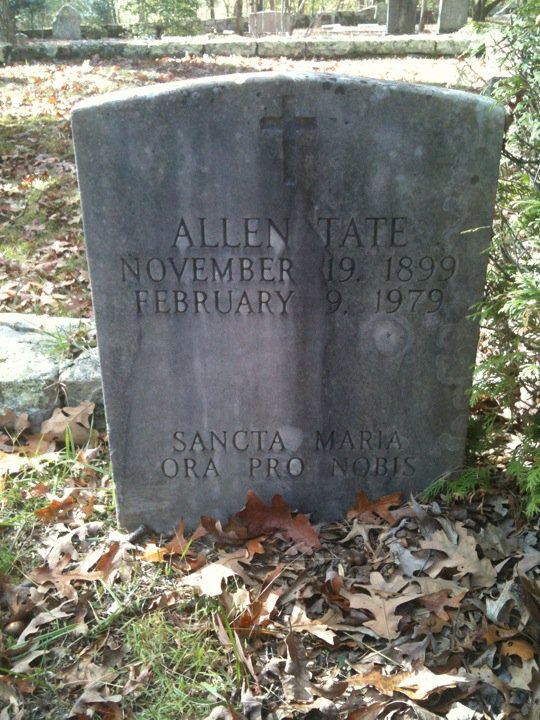I should be comfortable among the headstones
Of Tennessee, for I am a Southerner,
Father advised, before I fled to Philadelphia,
And, unlike the Northerners, disinclined
To say ‘no,’ to folks, or take the hard view,
But, as my mother asked my second wife,
Why does he keep marrying these Yankees?
Such are the bona fides that orientate me
In this neatly kept up, alternative Wasteland,
Just down the road from Barbeque Joe’s
And the flea market where bikinis on a line
Are decorated with the Stars and Bars.
Allen Tate is said to lie among these ranks.
Though I stand upon an infant’s grave and peer
Around the oaks and through the gates,
Chained back (for all may enter here),
Nothing marks him from my elevation.
Instead, my eye falls on the slim women
Who loiter on the porch of Stirling’s
Across the street. Labels on their shirts
Display their assumed creative identities
Of Poetry, Fiction and Playwriting.
They seem posed like Pierian figures,
And yet their purpose here is not to grant,
But to possess their own inspiration.
They have the look of those stern angels
Tate described as turning men to stone.
They defer a glance at me, a stiff voyeur,
While I scuffle for some official slate
That might help me recognize a buried poet.
I’m gray and leaning like these markers
That celebrate a final confederacy
And concerned, somewhat, that snakes,
Copperheads and rattlers, might take
My fascination with the young women
As a chance to strike, but nothing moves.
No one would make me out as a living actor
Set back among this broken marble,
As I take in monuments, unlettered
By a century of industrial weather,
In this necropolis of the academy.
Granite provides for Sewanee’s local color.
Yesterday, as I passed a traffic circle,
I was surprised by a layer cake memorial
to Bishop Leonidas Polk, Sewanee’s founder.
A childhood of education in the Lost Cause
enabled me to recognize him as a commander
of an infantry corps in Braxton Bragg’s army.
Once, I thrilled to read of Chickamauga.
Now, the stars slashed on flags along the rows
Summon for me the images of Dobermans
Set loose, of fire hoses that the sheriffs played
On singing marchers and of churches bombed.
Good Soldier Lee equals Good Soldier Rommel.
History has lectured enough on that equation.
Though no one is so impolitic at our conference
To discourse on blood, or race, I mention Polk.
Someone nods, then goes on to discuss
The problem of getting a second book published.
In classes, a few old names are turned over.
A poet from New York writes on Audubon.
Have you read Warren, I ask her. “Not really.”
Here, the craft of poetry is all business.
Tate, your oblique diction might be dismissed
In the writers’ workshops where tropes
Are as interchangeble as the musket parts
Colt milled. Better to offer civil criticism
than confront the ravenous grave of the South.
I leave the dead and cross to Stirling’s,
So much the image of the Victorian
Farmhouse that my mind puts up Brady’s
Photographs of lounging officers on porches.
Steam rises from the stout German boilers.
The muses have departed for their classes.
Tate, should I mine-sweep for your honors,
Interred among these generations of rage,
Or read your lines at midnight by your grave?
The students do their talking at the parties.
No one from town will claim the body
And those left here were silent all their lives.
Time coils around the stones and rattles,
Though the sound is neither ode nor elegy.



No Comments